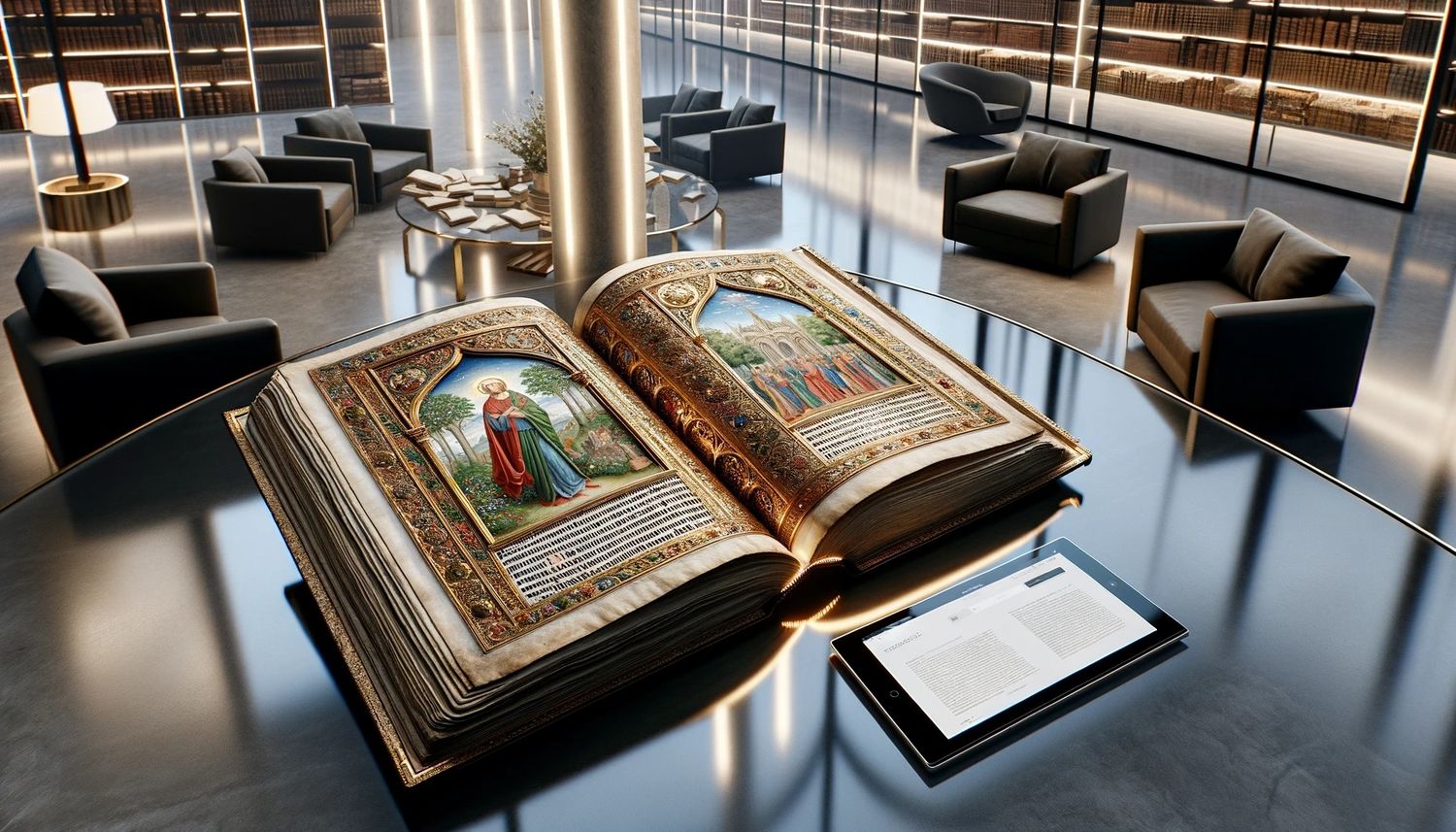Home>Theology and Spirituality>What Is The Holy Book Of Catholicism


Theology and Spirituality
What Is The Holy Book Of Catholicism
Published: February 17, 2024
Jason DeRose, Managing Editor at Christian.net, uses his expertise in religion and journalism to deepen understanding of faith's societal impacts. His editorial leadership, coupled with a strong academic background, enriches the platform’s diverse content, earning him recognition in both journalism and religious circles.
Discover the significance of the Holy Book of Catholicism and its role in theology and spirituality. Explore its teachings and impact on believers.
(Many of the links in this article redirect to a specific reviewed product. Your purchase of these products through affiliate links helps to generate commission for Christian.net, at no extra cost. Learn more)
Table of Contents
Introduction
The Holy Book of Catholicism holds a revered place in the hearts and minds of millions of believers worldwide. It serves as a guiding light, a source of wisdom, and a testament to the faith and traditions of the Catholic Church. The significance of this sacred text transcends time and continues to shape the lives of individuals and communities across the globe.
As we delve into the depths of Catholicism, it becomes evident that the Holy Book, known as the Bible, stands as the cornerstone of the faith. Its teachings, narratives, and moral precepts form the bedrock of Catholic beliefs and practices. Understanding the profound influence of the Bible within Catholicism unveils a rich tapestry of spiritual heritage and theological insight.
The Bible, as the central text of Catholicism, encapsulates the divine revelations and teachings that have been passed down through generations. Its pages resonate with the timeless accounts of creation, the trials and triumphs of humanity, and the profound messages of love, compassion, and redemption. Through its verses, Catholics find solace, guidance, and a profound connection to their faith.
In the following sections, we will embark on a journey to explore the intricacies of the Holy Book of Catholicism. We will unravel the structure of the Bible, delve into the profound significance of the Old and New Testaments, and illuminate the enduring importance of the Bible in shaping the beliefs and practices of Catholicism. Join us as we navigate the sacred passages and timeless wisdom contained within the pages of the Holy Book, and discover the profound impact it has on the lives of believers around the world.
The Bible: The Holy Book of Catholicism
The Bible stands as the foundational and revered text of Catholicism, embodying the divine revelations and teachings that form the bedrock of the faith. Comprising the Old Testament and the New Testament, the Bible serves as a sacred repository of spiritual wisdom, moral guidance, and historical narratives that have shaped the beliefs and practices of the Catholic Church for millennia.
For Catholics, the Bible represents more than just a collection of ancient texts; it is a living testament to the enduring presence of God in the lives of believers. Through its pages, the faithful encounter the profound narratives of creation, the trials and triumphs of humanity, and the timeless messages of love, compassion, and redemption. The Bible serves as a beacon of hope, offering solace, inspiration, and a profound connection to the divine.
Within the Catholic tradition, the Bible holds a central position in shaping the theological framework and moral precepts that guide the lives of believers. Its teachings provide a moral compass, offering insights into the nature of God, the complexities of human existence, and the path to spiritual fulfillment. Through the Bible, Catholics find a source of strength, comfort, and unwavering faith, as they navigate the complexities of life and seek deeper understanding of their relationship with the divine.
The Holy Book of Catholicism transcends the boundaries of time and culture, resonating with the hearts and minds of believers across diverse backgrounds and traditions. Its enduring relevance and universal appeal underscore its profound impact on the spiritual journey of individuals and the collective consciousness of the Catholic community.
As we delve deeper into the intricate tapestry of Catholicism, the Bible emerges as a sacred testament to the faith, offering a timeless reservoir of wisdom, inspiration, and divine revelation. Its significance within the Catholic tradition is unparalleled, serving as a cornerstone of faith, a source of spiritual nourishment, and a testament to the enduring presence of God in the lives of believers.
The Bible, as the Holy Book of Catholicism, encapsulates the essence of the faith, embodying the timeless truths and profound teachings that continue to illuminate the path of believers, offering guidance, solace, and a profound connection to the divine.
The Structure of the Bible
The Bible, as the Holy Book of Catholicism, is a remarkable compilation of sacred texts that are divided into two main sections: the Old Testament and the New Testament. This division reflects the historical and theological progression of divine revelation and serves as a foundational framework for understanding the rich tapestry of the Catholic faith.
The Old Testament
The Old Testament, also recognized as the Hebrew Scriptures, encompasses a collection of ancient writings that trace the history, laws, prophecies, and wisdom literature of the Israelites. It comprises diverse literary genres, including historical narratives, poetry, prophetic oracles, and wisdom literature. The Old Testament is divided into several categories, including the Pentateuch (the first five books), the historical books, the wisdom literature, and the prophetic books.
The New Testament
In contrast, the New Testament represents a profound shift in divine revelation, centered on the life, teachings, death, and resurrection of Jesus Christ. It comprises the four Gospels, the Acts of the Apostles, the Pauline and General Epistles, and the Book of Revelation. The New Testament serves as a testament to the life and teachings of Jesus, the establishment of the early Christian Church, and the theological insights conveyed through the letters of the apostles.
The Importance of the Bible in Catholicism
The structure of the Bible reflects the progressive nature of divine revelation, culminating in the life, death, and resurrection of Jesus Christ. This structural division underscores the continuity and fulfillment of God's covenant with humanity, as articulated through the narratives, prophecies, and teachings contained within its pages.
The Old Testament lays the foundation for understanding the historical and cultural context in which the covenant between God and the Israelites was established. It provides insights into the moral and ethical precepts that guided the lives of the ancient Israelites and serves as a testament to the enduring faithfulness of God throughout history.
Conversely, the New Testament illuminates the transformative impact of Jesus Christ's ministry, offering a profound vision of redemption, grace, and the establishment of the Christian Church. It serves as a testament to the fulfillment of God's promises, the sacrificial love of Christ, and the enduring legacy of the apostolic teachings that continue to shape the beliefs and practices of the Catholic Church.
In essence, the structure of the Bible embodies a seamless narrative of divine revelation, historical progression, and theological insight, serving as a sacred testament to the enduring presence of God in the lives of believers. Its profound significance within Catholicism underscores the timeless relevance of its teachings, the enduring impact of its narratives, and the transformative power of its message.
The Bible, as the structured compilation of the Old and New Testaments, stands as a testament to the enduring presence of God in the lives of believers, offering a profound narrative of divine revelation, historical progression, and theological insight that continues to shape the beliefs and practices of the Catholic Church.
The Old Testament
The Old Testament, also known as the Hebrew Scriptures, holds profound significance within the sacred canon of the Bible. It encompasses a rich tapestry of ancient writings that offer insights into the history, laws, prophecies, and wisdom literature of the Israelites. This foundational section of the Bible provides a comprehensive understanding of the cultural, religious, and moral landscape that shaped the lives of the ancient Israelites and continues to resonate with profound relevance in the hearts and minds of believers today.
The Old Testament is a diverse compilation of literary genres, including historical narratives, poetry, prophetic oracles, and wisdom literature. It is divided into several categories, each contributing to the multifaceted tapestry of divine revelation and human experience. The Pentateuch, comprising the first five books of the Old Testament, stands as a cornerstone of Jewish and Christian faith, offering narratives of creation, the patriarchal history, the exodus from Egypt, and the establishment of the Mosaic covenant. These foundational narratives provide a historical and theological framework for understanding the origins of the Israelite nation and the covenantal relationship between God and His chosen people.
Furthermore, the historical books within the Old Testament offer a compelling portrayal of the triumphs, struggles, and spiritual journey of the Israelites as they navigated the complexities of nationhood, monarchy, exile, and restoration. These narratives provide invaluable insights into the socio-political dynamics, religious reforms, and prophetic voices that shaped the historical trajectory of the Israelite nation.
The wisdom literature of the Old Testament, including the poetic and philosophical reflections found in the Psalms, Proverbs, Job, Ecclesiastes, and the Song of Solomon, offers timeless wisdom and spiritual insight that continues to resonate with believers across generations. These profound reflections on the nature of God, the complexities of human existence, and the pursuit of wisdom and righteousness provide a source of solace, guidance, and spiritual nourishment for individuals seeking deeper understanding and connection with the divine.
Moreover, the prophetic books within the Old Testament convey powerful messages of divine judgment, restoration, and hope, as articulated through the voices of the prophets who called the Israelites to faithfulness, social justice, and covenantal renewal. These prophetic oracles offer a compelling vision of God's enduring faithfulness, His call to righteousness, and the promise of a future restoration that continues to inspire believers to seek justice, mercy, and unwavering faith in the midst of adversity.
In essence, the Old Testament stands as a testament to the enduring legacy of the Israelite faith, offering a profound narrative of historical, theological, and moral significance that continues to shape the beliefs and practices of the Catholic Church and the broader Christian tradition. Its timeless wisdom, historical narratives, and prophetic insights serve as a testament to the enduring presence of God in the lives of believers, offering guidance, inspiration, and a profound connection to the divine.
The New Testament
The New Testament represents a profound shift in divine revelation, centered on the life, teachings, death, and resurrection of Jesus Christ. It comprises the four Gospels, the Acts of the Apostles, the Pauline and General Epistles, and the Book of Revelation. Each component of the New Testament contributes to a comprehensive understanding of the life and teachings of Jesus, the establishment of the early Christian Church, and the theological insights conveyed through the letters of the apostles.
The Gospels, including the accounts of Matthew, Mark, Luke, and John, offer a compelling portrayal of the life, ministry, teachings, death, and resurrection of Jesus Christ. These narratives provide a profound insight into the compassionate nature of Jesus, His transformative teachings, His miraculous deeds, and His ultimate sacrifice for the redemption of humanity. The Gospels serve as a testament to the profound impact of Jesus' life and teachings, offering a compelling vision of divine love, grace, and the establishment of the Kingdom of God on earth.
The Acts of the Apostles, authored by Luke, provides a historical account of the early Christian Church, chronicling the spread of the Gospel message, the establishment of Christian communities, and the transformative impact of the Holy Spirit on the lives of believers. This historical narrative offers insights into the challenges, triumphs, and unwavering faith of the early Christians as they navigated the complexities of spreading the message of Jesus Christ in diverse cultural and religious contexts.
The Pauline Epistles, comprising the letters written by the apostle Paul to various Christian communities, offer profound theological insights into the nature of salvation, the role of faith in Christ, and the ethical imperatives of Christian living. These letters provide a comprehensive framework for understanding the transformative impact of the Gospel message, the unity of believers in Christ, and the practical implications of living out the teachings of Jesus in everyday life.
The General Epistles, including the letters of James, Peter, John, and Jude, offer diverse perspectives on the challenges, ethical imperatives, and enduring hope found in the Christian faith. These letters provide practical guidance for navigating the complexities of faith, addressing social injustices, and cultivating a steadfast commitment to the teachings of Jesus amidst adversity and persecution.
The Book of Revelation, attributed to the apostle John, offers a profound vision of divine judgment, the ultimate triumph of good over evil, and the establishment of a new heaven and a new earth. This apocalyptic text provides a compelling portrayal of the cosmic battle between the forces of darkness and the ultimate victory of God's redemptive plan for humanity.
In essence, the New Testament stands as a testament to the transformative impact of Jesus Christ's life, teachings, death, and resurrection, offering a profound vision of redemption, grace, and the establishment of the Christian Church. Its theological insights, historical narratives, and ethical imperatives continue to shape the beliefs and practices of the Catholic Church, offering guidance, inspiration, and a profound connection to the divine.
The Importance of the Bible in Catholicism
The Bible holds unparalleled significance within the framework of Catholicism, serving as a foundational source of divine revelation, moral guidance, and spiritual nourishment for believers. Its profound impact on the beliefs and practices of the Catholic Church underscores its enduring relevance and transformative power in shaping the lives of individuals and the collective consciousness of the faith community.
At the heart of Catholicism, the Bible stands as a sacred testament to the enduring presence of God in the lives of believers. Its teachings offer a moral compass, guiding individuals on the path of righteousness, compassion, and unwavering faith. The narratives contained within its pages provide a profound connection to the historical and theological heritage of the faith, offering insights into the complexities of human existence and the redemptive love of God.
The Bible serves as a reservoir of wisdom, offering timeless insights into the nature of God, the complexities of human experience, and the path to spiritual fulfillment. Its teachings provide a source of strength, comfort, and unwavering faith, as believers navigate the complexities of life and seek deeper understanding of their relationship with the divine.
Within the Catholic tradition, the Bible plays a pivotal role in shaping the theological framework and moral precepts that guide the lives of believers. Its teachings offer a compelling vision of divine love, mercy, and justice, inspiring individuals to embody these virtues in their interactions with others and in their pursuit of social justice and compassion.
Moreover, the Bible serves as a unifying force within the Catholic community, offering a shared narrative of faith, hope, and redemption that transcends cultural and geographical boundaries. Its teachings provide a common ground for believers to draw inspiration, find solace, and deepen their spiritual connection to the divine, fostering a sense of unity and collective purpose within the faith community.
In essence, the Bible stands as a testament to the enduring presence of God in the lives of believers, offering a timeless reservoir of wisdom, inspiration, and divine revelation. Its significance within Catholicism underscores the transformative power of its teachings, the enduring impact of its narratives, and the profound connection it fosters between individuals and the divine.
Read more: What Type Of Book Is The Book Of Revelation
Conclusion
In conclusion, the Holy Book of Catholicism, the Bible, stands as a timeless testament to the enduring presence of God in the lives of believers. Its structured compilation of the Old and New Testaments offers a profound narrative of divine revelation, historical progression, and theological insight that continues to shape the beliefs and practices of the Catholic Church. The Old Testament, with its rich tapestry of historical narratives, wisdom literature, and prophetic oracles, provides invaluable insights into the cultural, religious, and moral landscape that shaped the lives of the ancient Israelites. Similarly, the New Testament, centered on the life, teachings, death, and resurrection of Jesus Christ, offers a compelling vision of redemption, grace, and the establishment of the Christian Church.
The importance of the Bible in Catholicism cannot be overstated. It serves as a moral compass, guiding individuals on the path of righteousness, compassion, and unwavering faith. The narratives contained within its pages provide a profound connection to the historical and theological heritage of the faith, offering insights into the complexities of human existence and the redemptive love of God. Moreover, the Bible fosters a sense of unity and collective purpose within the faith community, offering a shared narrative of faith, hope, and redemption that transcends cultural and geographical boundaries.
As the foundational and revered text of Catholicism, the Bible continues to inspire, guide, and nurture the spiritual journey of individuals and communities across the globe. Its enduring relevance, universal appeal, and transformative power underscore its profound impact on the lives of believers. The teachings, narratives, and moral precepts contained within its sacred pages offer a timeless reservoir of wisdom, inspiration, and divine revelation, fostering a profound connection between individuals and the divine.
In essence, the Bible stands as a living testament to the enduring presence of God in the lives of believers, offering a source of strength, comfort, and unwavering faith as they navigate the complexities of life. Its significance within Catholicism encapsulates the essence of the faith, embodying the timeless truths and profound teachings that continue to illuminate the path of believers, offering guidance, solace, and a profound connection to the divine.













